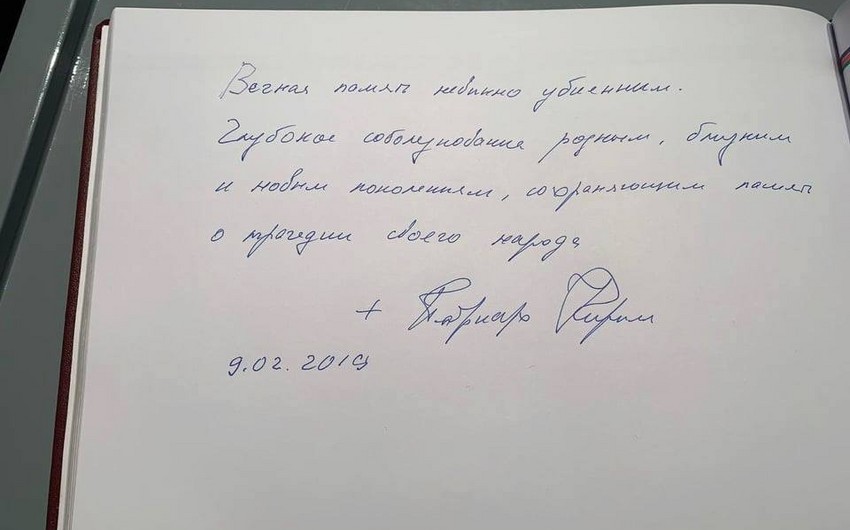Baku. 12 February. REPORT.AZ/ Patriarch Kirill of Moscow and All Russia has recently paid a visit to Azerbaijan. This was not his first visit. However, this visit was memorable for one moment. Patriarch Kirill visited the Guba Genocide Memorial Complex on February 9, commemorating the tens of thousands of Azerbaijanis killed in the massacres committed by the Bolshevik-Armenian armed forces in the Azerbaijani lands in 1918.
He wrote his memoirs in the Memo book:"To the eternal memory of the murdered innocents. I sincerely express my deepest condolences to the relatives and friends of the new generation that remembers the tragedy of their people.
+ Patriarch Kirill 9.02.2019 ".
Notably, between March 30 and April 3, 1918, Armenian armed groups from Baku Soviet and Dashnaktsutyun committed genocide against Azerbaijanis in Baku and in different regions of Baku province, Shamakhi, Guba, Khachmaz, Lankaran, Hajigabul, Salyan, Zangazur, Garabagh, Nakhchivan and other regions.

By the decree of late Azerbaijani President , March 31 is marked as the Day of Genocide of Azerbaijanis.
At a meeting with Patriarch Kirill on February 5, President of the Republic of Azerbaijan said: "There are many reasons that connect us to history, and today, as we are actively interacting in all directions, this cooperation is of particular importance in our region, in strengthening peace in the Caucasus. Therefore, when we look at the entire spectrum of interstate relations, of course, we see positive dynamics. From this point of view, your current visit plays a special role." Patriarch Kirill said in his turn: " I can assure you on behalf of the Russian Orthodox Church hierarchy of the Russian Orthodox Church, including the clergy in Azerbaijan, that there are reliable partners for the further development of relations between Azerbaijan and Russia." He stressed that the lack of inter-religious tension in Russia is also related to the position of Muslims in Azerbaijan.
Historically, the Russian Orthodox Church has been respected in Azerbaijan. Azerbaijani philanthropist, millionaire Haji Zeynalabdin Taghiyev donated funding for construction of Cathedral of Christ the Saviour in Moscow. This church was commissioned to the believers in February 2018 after reconstruction and restoration work.

In fact, although religion in Russia is separated from the state, but the church always has its say in ensuring the interests of the state. This can be clearly seen in issues related to the Russian-Ukrainian relations. So Patriarch Kirill's visit to Baku and Guba can be evaluated in terms of Russia's interests. Because the church considers itself a successor to the Byzantine Empire. All-Russian Orthodox Church plays an undeniable part in the in formation of the Russian state and growth of its empire. Former USSR opposed all religions under the name of atheism or kept its religion under the control of the government. Of course, the Russian Orthodox Church also suffered from such repression. After Russia became an independent state, the church began to revive. The Patriarch of Moscow and All Russia has always commented on the events in the international arena. From this point of view, his visit to the Guba Genocide Memorial Complex, calling the events a massacre is part of Russia's foreign policy towards Azerbaijan. By the way, Kirill visited Yerevan in 2010. 9 years have passed since that time.
Moscow's supporters have been sacked in Armenia. The new political force does not treat Russia unequivocally. Russia is concerned about their behavior and activities. It seems clear that the Kremlin has been pressuring new forces coming to power in Armenia in a number of spheres. Patriarch Kirill's visit to the Genocide Memorial Complex can also be counted as an example. Moreover, Moscow drew a conclusion from the separation of the Ukrainian Orthodox Church from Russia. In spite of some inter-sectarian divisions, the Etchmiadzin Cathedral in Armenia has been cooperating with the Russian Orthodox Church for many years.
Finally, there was a number of dissatisfaction with the Armenian Prime Minister Nikol Pashinyan and this church. Recently, there is rapprochement in their relationship. The church in Russia is already improving its influence to avoid the repetition of what happened with Ukrainian Orthodox Church. In other words, by visits to Azerbaijan messages are being sent to Armenia. True, the Russian State Duma has declared “April 24 victims of genocide” on April 24, 1995, after Armenian allegations regarding the events of April 24, 1915. However, some 24 years have passed since that date.
It can be said that Patriarch Kirill wants to create a balance between Genocide Memorial Complex and April 24.
In our opinion, as one of the three co-chairing states of the Minsk Group, mediating the settlement of the conflict in the occupied Nagorno-Karabakh region of Azerbaijan, Russia tries to gain more confidence with the visit of Patriarch Kirill. In all cases, the event is a recognition of the March 31 massacre by the All-Russian Orthodox Church.


 https://static.report.az/photo/c4d1000f-424d-462b-becd-c49c42d10d95.jpg
https://static.report.az/photo/c4d1000f-424d-462b-becd-c49c42d10d95.jpg

